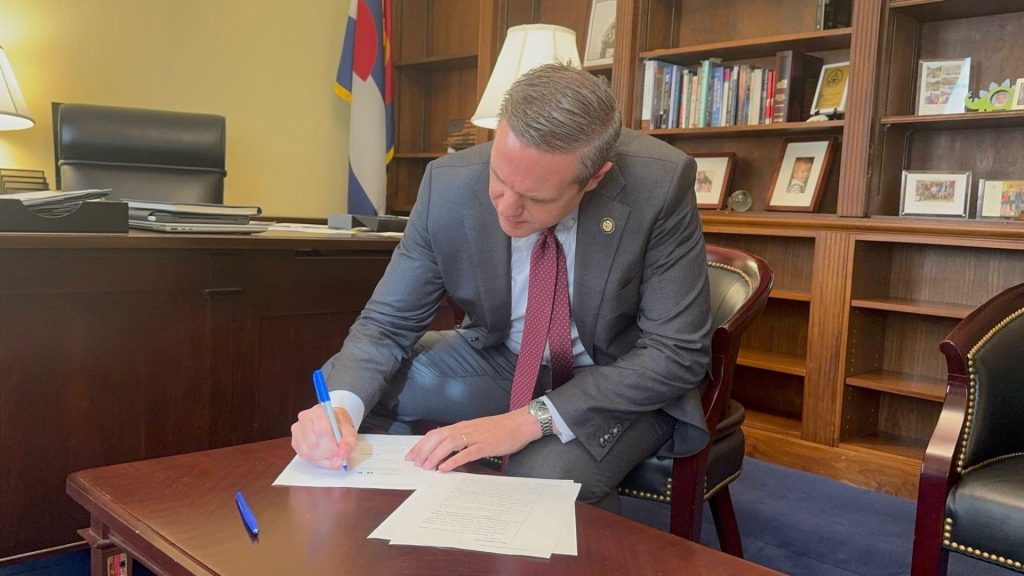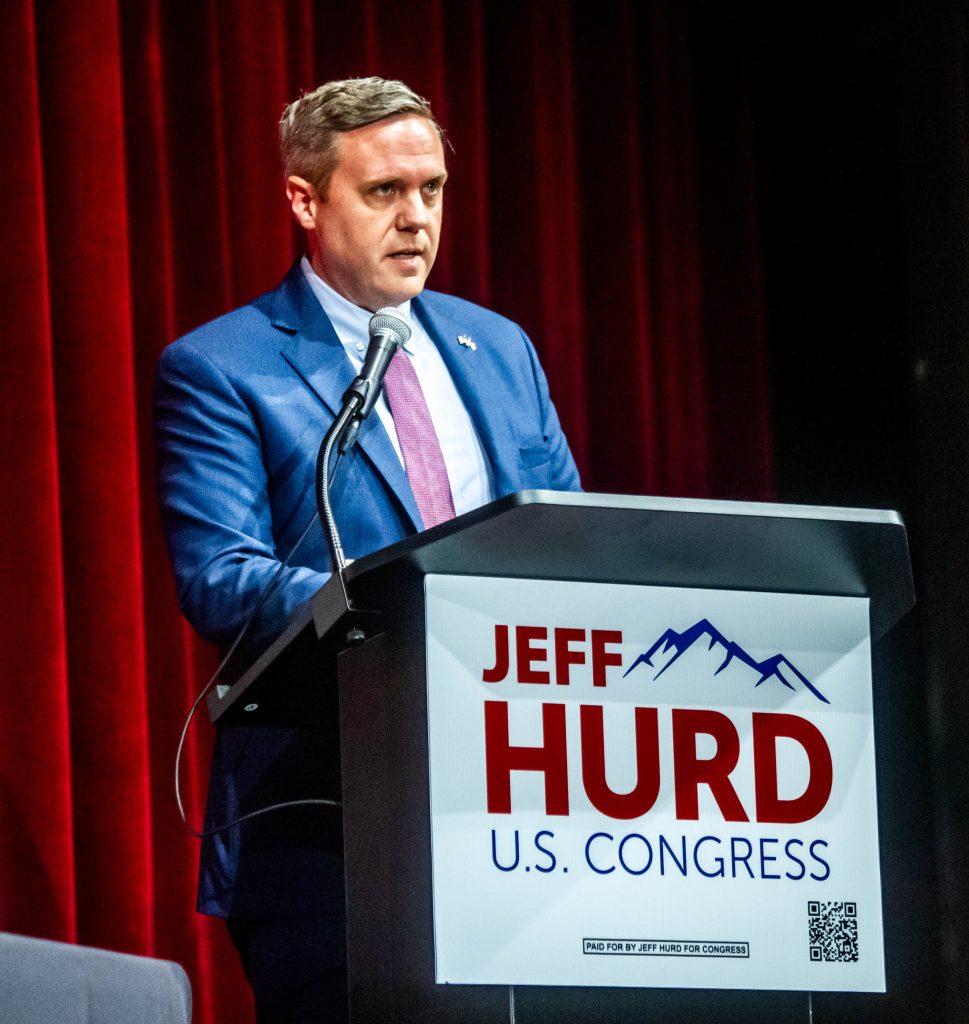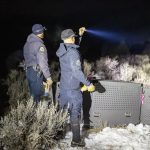Colorado Rep. Jeff Hurd fields questions on ‘big, beautiful bill,’ public lands, Charlie Kirk killing during telephone town hall
The Republican congressman from western Colorado championed Trump’s marquee domestic policy bill and defended free speech rights in the wake of Kirk’s killing

Larry Robinson/Grand Junction Daily Sentinel
U.S. Rep. Jeff Hurd fielded a range of questions from constituents in Colorado’s sweeping 3rd Congressional District during a Wednesday night telephone town hall.
Much of the roughly hour-long call revolved around questions that had to do with President Donald Trump’s “one big, beautiful bill,” public lands protections and Hurd’s reaction to the shooting and killing of conservative commentator Charlie Kirk.
Hurd, a Grand Junction Republican, is less than a year into his role representing the 3rd Congressional District, which spans much of western and southern Colorado. Along with his hometown, the district includes Aspen, Glenwood Springs, and Pueblo.
The ‘big, beautiful bill’ and Medicaid
The first-year lawmaker was repeatedly asked about the “big, beautiful bill” — the sweeping tax and spending measure signed into law in July. Hurd, alongside Colorado’s three other House Republicans, voted in favor of it.
The marquee bill of Trump’s second term, the legislative package contains a suite of tax cut extensions and expansions, more money for immigration enforcement and border security, mandatory lease sales for oil and gas drilling on public lands, and new limits on eligibility for social safety net programs.
Several callers asked Hurd about the bill’s impact on health care, specifically Medicaid, which covers more than 1 in 5 Coloradans. His district has the highest rate of Medicaid recipients in the state.
The “big, beautiful bill” institutes new Medicaid work requirements starting in 2027 and will require Medicaid recipients to prove their eligibility more frequently. It also reduces federal Medicaid funding for states, mostly through a cap on provider taxes or fees, which states use to leverage more federal dollars. That provision goes into effect in 2028.
Taken together, the changes are expected to reduce federal Medicaid spending by about $1 trillion and lead to 7.5 million people in the U.S. losing Medicaid by 2034, according to the Congressional Budget Office.
Republicans have largely defended the changes as a way of making Medicaid more efficient. Hurd said the provisions will help ensure Medicaid is serving “the most vulnerable populations,” including pregnant women, children, seniors, and people with disabilities.

The new work requirements will apply to “able-bodied” adults aged 19-64 and can be met by either working, going to school, or volunteering for about 20 hours a week.
“It seems to me like that’s a pretty common-sense reform that we’re talking about,” he said.
Hurd repeatedly signaled he opposed cuts to Medicaid that would threaten services or access to care, such as the cap on provider fees, even as he voted to advance the bill every step of the way. One caller said she was encouraged by Hurd’s initial stance on Medicaid as the bill was being crafted but was disappointed by his ultimate support for the measure.
Sunrise Rundown: Headlines. Breaking News. Local Updates.
Get your essential news every weekday from The Aspen Times—start your day informed.
Sign up for the Sunrise Rundown at AspenTimes.com/newsletter
She said she didn’t want to see Hurd’s support for another health care bill, one to extend Affordable Care Act insurance subsidies, end up the same as his decision on Medicaid.
He said his vote for the “big, beautiful bill” was consistent with his pledge to make Medicaid more sustainable for the core demographics it serves. He added that there’s time for Congress to make changes to the bill before some of the Medicaid provisions go into effect, and he pledged to push for an extension of ACA subsidies to prevent a surge in insurance costs next year.
Hurd, on several occasions, said the tax and spending measure is “not a perfect bill.” But he said it delivers financial relief for working- and middle-class individuals and families.
He highlighted provisions in the bill that reduce taxes on a portion of workers’ overtime pay and allow workers to deduct up to $25,000 of reported tips from their federal income tax, both of which last through 2028.
He also touted several of the bill’s lesser-known provisions, including a permanent expansion of the child tax credit, billions of dollars for air traffic control improvements, and $1 billion for water infrastructure projects.
Public lands protection
Public lands and efforts to protect them were another dominant theme of Wednesday’s town hall.
A failed plan earlier this year by a Republican Utah senator to sell off millions of acres of federal land in the West ignited a fierce opposition campaign from public lands advocates, who found bipartisan allies in Congress.
Hurd was staunchly opposed to the idea and even helped kill a smaller proposal in the House that would’ve mandated the sale of around half a million acres of federal land in Utah and Nevada. He was the only Republican on a GOP-dominated House committee to vote against the plan.
Responding to a question about what he’s doing in Congress to protect public lands, he said the “broad sell-off of public lands without the input of the people that live in our district is something that I’m opposed to … and I’m going to continue to take that approach.”

He was also asked why he supports the Gunnison Outdoor Resources Protection Act, which is being led by Democratic U.S. Sen. Michael Bennet.
The legislation would protect more than 700,000 acres of land in and around Gunnison County, touching on areas in neighboring Saguache, Ouray, Hinsdale, Delta, and Pitkin counties. That includes withdrawing more than 74,000 acres of land in Delta County’s North Fork Valley from oil and gas development.
Hurd in May signed on as a sponsor of that legislation in the House, and the bill maintains broad support from Republican and Democratic-controlled counties, local recreation, conservation and agriculture groups, as well as the Ute Mountain Ute Tribe.
“One of the issues that I campaigned on is listening to the people I represent and having the people that live in the communities and counties help me make decisions when it comes to how we use our federal lands,” he said.
Hurd also said he supports a “multiple-use” strategy on public lands, which means balancing various simultaneous activities, including recreation, drilling, logging, and conservation. He and other Republicans have criticized former President Joe Biden’s administration for prioritizing conservation and limiting energy extraction over other uses.
“I think that we can find a balance,” Hurd said. “It’s not an ‘either-or.'”
Charlie Kirk and free speech
Several callers asked Hurd about his reaction to the shooting and killing of conservative commentator Charlie Kirk, who was assassinated on Sept. 10 during a speaking event at Utah Valley University.
Many of the questions revolved around issues of free speech in the wake of Kirk’s death.
One caller asked why Hurd voted against a motion to censor Minnesota Democratic Rep. Ilhan Omar. Hurd was one of just four House Republicans who opposed the measure on Wednesday, which would have stripped Omar of her committee seats. The motion sought to punish her over comments she made following Kirk’s death.
The resolution to censure her does not contain any direct quotes she made but references social media posts by others criticizing Kirk, which she shared. It also references an interview Omar did the day after Kirk’s killing in which she called his death “really mortifying” and expressed sympathy for his family, while also criticizing what she called the politicization of Kirk’s murder along with his past comments.
Hurd called Omar a “crazy liberal congresswoman” but said he voted against censuring her because he felt it would have infringed on her First Amendment rights.
“I think the right response to reprehensible speech, like what she did, isn’t silencing someone, it’s more speech,” he said, “and I would say that’s what Charlie Kirk believed and that’s what he practiced.”
Others raised concerns that the Trump administration was using Kirk’s death to silence Kirk’s dissenters and critics of Trump’s government. Hurd didn’t address any specific incidents but said he believes strongly in free speech, even when he disagrees.
“One of the things I think I’m trying to model in Congress is thoughtful and principled engagement that is on the level of ideas,” he said, “and attacking ideas and engaging ideas, rather than people.”
Pitkin County building electrification costs more than expected
A year-long effort to electrify the Pitkin County Library and the Schulz Health and Human Services building have come to a crossroads as Pitkin County staff grapple with higher than expected costs for the projects.
Coyote or gray wolf? How to tell the difference in the Roaring Fork Valley
As hunting season gets under way, Colorado Parks and Wildlife is warning those with coyote tags to be aware of the differences between coyotes and wolves.










